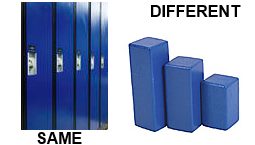

Compare and Contrast Literature6th Grade |
|
|---|---|
Arizona Academic Standards: 6.RL.9Common Core State Standards: Literacy.RL.6.9Georgia Math and ELA Standards: ELAGSE6RL9 |
|
Compare and contrast texts in different forms or genres (e.g., stories and poems; historical novels and fantasy stories) in terms of their approaches to similar themes and topics. |
|
North Carolina - Standard Course of Study: RL.6.9Tennessee Academic Standards: 6.RL.IKI.9 |
|
Compare and contrast texts in different forms or genres in terms of their approaches to similar themes and topics. |
|
New York State Next Generation Learning Standards: 6R9 |
|
Use established criteria in order to evaluate the quality of texts. Make connections to other texts, ideas, cultural perspectives, eras, and personal experiences. (RI&RL) |
|
Wisconsin Academic Standards: R.6.9 |
|
Evaluate the quality of texts. Make connections to other texts, ideas, cultural perspectives, identities, eras, and personal experiences. (RI&RL) |
|
Texas Essential Knowledge and Skills (TEKS): 6.3.B* |
|
analyze the function of stylistic elements (e.g., magic helper, rule of three) in traditional and classical literature from various cultures |
|
Texas Essential Knowledge and Skills (TEKS): 6.3.C* |
|
compare and contrast the historical and cultural settings of two literary works |
|
Texas Essential Knowledge and Skills (TEKS): FIGURE 19.F* |
|
make connections (e.g., thematic links,author analysis) between and across multiple texts of various genres, and provide textual evidence |
|
Pennsylvania Core Standards: CC.1.3.6.H |
|
Compare and contrast texts in different forms or genres in terms of their approaches to similar themes and topics as well as their use of additional literary elements. |
|
Pennsylvania Core Standards: E06.A-C.3.1.1 |
|
Compare and contrast texts in different forms genres (e.g., stories, dramas, poems, historical novels, fantasy stories) in terms of their approaches to similar themes and topics. |
|
Arkansas Academic Standards: 6.RC.9.RL |
|
Examine two texts of varying structures or genres that have similar themes and/or topics. |
|
Arkansas Academic Standards: 6.RC.10.RL |
|
Identify the theme in an original, adapted, or modernized drama, poem, folktale, or story from world literature (beginnings of civilization through 1450), explaining its historical and/or contemporary significance. |
|
Georgia Math and ELA Standards: 6.T.C.2.c |
|
Identify and analyze the impact of background information and context (e.g., geography, location, era, historical happenings) on text development. (I) |
|
Georgia Math and ELA Standards: 6.T.T.1.d |
|
Compare and contrast literary texts in different modes and genres (e.g., historical novels and fantasy texts) in terms of their approaches to similar themes and topics. (I) |
|
 6th Grade Reading - Compare and Contrast Literature Lesson
6th Grade Reading - Compare and Contrast Literature Lesson




